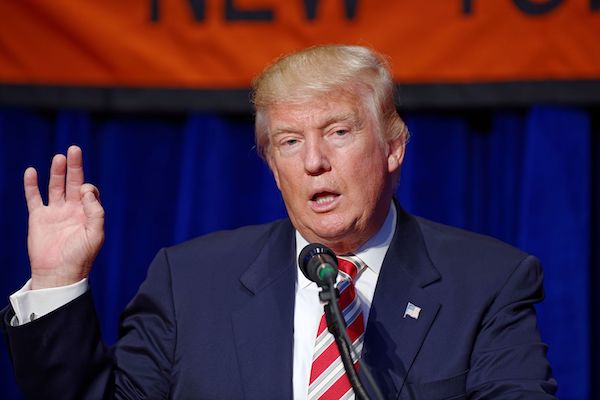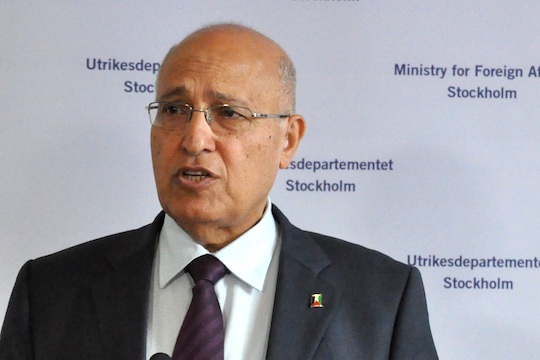Americans will still have a long way to go before they can decide what their country represents. Once they do, Palestinians can begin to care again about what happens in Washington.

As a Palestinian contributor to +972, I have been struggling these past weeks with how to write about the US presidential election. Part of the problem is that this year’s nominees have hardly touched on our part of the world. Beyond the shock-jock antics of the Republican candidate or the very real resurgence of hate among the American electorate, this election has revealed America’s distinct lack of awareness about its role in the world.
The Palestinian question and the conflict that sustains it are no exception. Despite massive U.S. foreign aid deals linked to the conflict — with Israel and with neighboring countries that have inked peace deals at Washington’s urging — Palestine has hardly figured in the rhetoric of either Republicans or Democrats. But if the candidates have had precious little to say about Palestine, the real story may be how little Palestinians seem to care.
Consider a poll released this month by Al Najah University. In it, Palestinians opined on British responsibility for their current predicament (79 percent “considered Britain responsible for the catastrophes that befell” them), on a French initiative to restart Palestinian-Israeli talks (63 percent said it would fail), and on a similar Russian call (49 percent supported it).
There wasn’t a single mention of Donald Trump or Hillary Clinton. In fact, there was no reference to the United States at all.
That same ambivalence to the United States seems to prevail among the political elite in Ramallah. Although Palestinian officials may be taking the customary tack of sitting out an American election — the better to not distance themselves from a potential winner — I wonder if there may be more to their silence.
The fact is that Palestinian officials’ opinions of American politics have typically relied on what they hear in Washington. But if this U.S. election season has exposed anything, it is how out of touch Washington really is with what the rest of the country wants. If no one in Washington can explain how a demagogue came so close to the White House, perhaps it’s time Palestinians started listening to voices outside the capital’s Beltway.
It’s a lesson Palestinian activists in the United States learned long ago. In the last decade alone, their grassroots efforts have helped expose American sympathies toward the Palestinian struggle and latent resentment toward Washington’s massive cash assistance to Israel. Consider, for example, that no less than the New York Times, in a September 16 editorial, called the most recent billion-dollar U.S. aid package to Israel “too big.”
Such a proclamation from the “newspaper of record” would have been inconceivable a decade ago, and yet it points to an opportunity not lost on Palestinian advocates in the United States. They know that, with America’s middle class shrinking, its working class immobile under the weight of lost jobs and soaring costs, the “America first” ethic heard so loudly beyond the Beltway could eventually upend Washington’s expensive relationship with Israel.
Read: Trump is reaching into Bibi’s election playbook
But you wouldn’t know it if you spent all your time in Washington — as so many Palestinian “negotiators” have.
The problem isn’t that the Israeli lobby controls the discourse in Washington or that Congress too often seems to operate at that lobby’s behest (after all, the Iran deal put more than a little chink in that lobby’s armor). The problem is that these negotiators never really believed America could be malleable on the subject of Israel.
That may be changing. Just last week, for example, former Palestinian negotiator Nabil Shaath told an interviewer that Palestinians “should start depending on ourselves, not wait for others to give us our rights.” Coming from someone who had been a frequent visitor to Washington and a staunch defender of the piecemeal Oslo process, that is hardly a throwaway comment.

But if Palestinians have given up waiting for Oslo’s broker, America, to “give us our rights,” what are the alternatives?
In a different era, the answer might have had something to do with Arab nationalism, or at least a sense of popular solidarity in the region. But with “the Arab street” burning, Palestinians can hardly expect more than the usual lip service from flailing regimes that have largely lost their legitimacy.
What about international law? If Syria is any indication, even the most basic precepts — those governing the protection of civilians, hospitals, schools — can no longer be enforced by the international community. Barring another devastating attack on Gaza, the Israeli occupation can remain at a low burn while the rest of the region consumes itself and, more to the point, the headlines.
Is grassroots resistance the way forward? Maybe. But in the absence of another headline-grabbing war on Gaza, and with media attention turned to massacres from Syria to Yemen, how much traction can a homegrown Palestinian struggle have on the international stage?
The answer to that question comes down to how effective Palestinians’ advocates are. And as much progress as U.S.-based activism has achieved, bringing the old Oslo guard into the fold will only multiply the impact of that activism. But first, that old guard needs to make a deliberate decision to stop taking its cues from Washington.
The consequences won’t be easy, of course. At the very least, much of the Palestinian Authority’s payroll — down to the ordinary bureaucrats whose families depend on their salaries — comes with American strings attached. But there are also alternatives to raising this capital, including from the Palestinian diaspora. (For an interesting perspective on how Palestinians can work toward economic self-reliance, see, for example, this Al-Shabaka brief.)
What is clear in all cases, though, is that America is out of touch — with the rest of the world and with itself. That is never more apparent than during a U.S. election season, of course, when Washington insiders outdo one another in sop after sop to populism. But unlike elections past, the rift exposed by this year’s contest seems likely to remain, even widen. Remember that, not only has the Republican candidate refused to say whether he would accept the outcome of the November 8 poll; some of his most prominent followers have so much as vowed armed revolt if their candidate loses.
In such a climate, seeing America through the prism of Washington’s elite would not only be a mistake. It would signal willful participation in the near-sightedness so characteristic of American politics—the same near-sightedness that brought us the war in Iraq, the haphazard approach to Syria, Yemen’s massacres by fiat.
And Trump.
For now, Palestinians don’t need to mark their calendars for November 8th. After all, when the polls close on that day, Americans will still have a long way to go before they can decide what their country represents—to themselves and to the world. Once they do, Palestinians can begin to care again about what happens in Washington.
Till then, there will be other stories to write.


